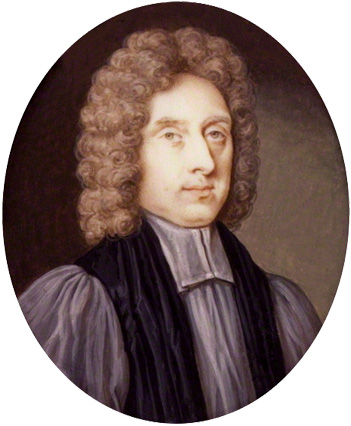| Profile | Major Works | Resources |
Bishop William Fleetwood, 1656-1723

Born in the Tower of London, and descended from a notable Lancashire family, William Fleetwood was educated at Eton and enrolled in King's College, Cambridge in 1675. Fleetwood was ordained an Anglican priest around the time of the Glorious Revolution 1688, and subsequently made rector of St. Austin's London. Making a name for himself as a gifted preacher, he also became a lecturer and Dunstan's, and was appointed royal chaplain to king William III and Mary II of England. He was made canon of Windsor around 1702. In 1708, Fleetwood was invested at Bishop of St Asaph (Wales). After the ascension of George I, Fleetwood was transferred in 1714 to the prestigious see of Bishop of Ely (Cambridgeshire).
In religious matters, Fleetwood was a solid, even zealous, Protestant Whig, who embraced the Glorious Revolution as Divine providence, confirming England's mission in the cause of international protestantism. He opposed the High Church Toryism preached by Henry Sacheverell, that gained popularity in certain quarters (especially the universities) during Queen Anne's reign. Fleetwood was one of the principal figures behind the Society for the Propagation of the Gospel in Foreign Parts (SPG), formed in 1701, to promote conversion of indigenous peoples in Africa, as well as natives and slaves in the American colonies, to Anglican Christianity.
Although sometimes casually referred to as a Mercantilist, William Fleetwood was not a Mercantilist thinker in any sense. William Fleewtood's principal claim to be on this list was his 1707 Chronicon Preciosum, a massive collection of historical price statistics.
The nearly-as-massive sub-title of the second (1745) edition of the work explains Fleetwood's motive: he wanted to calculate if £5 in 1700 was worth the same as £5 in 1400. The reason was eminently of urgent academic interest: an eligibility condition for receiving a fellowship established by a college charter c.1440 (conjectured that Fleetwood had either All Soul's, Oxford or his own King's College, Cambridge in mind) is that the student must not have an alternative outside income that exceeds £5. If he does, then he must forfeit the fellowship. Fleetwood sought to demonstrate that this original £5 condition should be adjusted for purchasing power, that inflation since the 15th C. made it a very low threshold that most current students easily surpassed. Fleetwood compared the value of different commodities and stipends across the centuries concluded that the fellowship should be kept. Fleetwood's 1707 treatise was heralded by Edgeworth (1925) as "the oldest and one of the best treatises on index-numbers" before the modern age.
William Fleetwood touches on some economic matters in some of his sermons (e.g. clipping, 1694, debts, 1718), but more from angle of personal morality than political economy.
|
Major Works of William Fleetwood
|
|
HET
|
|
Resources on William Fleetwood
|
All rights reserved, Gonçalo L. Fonseca
